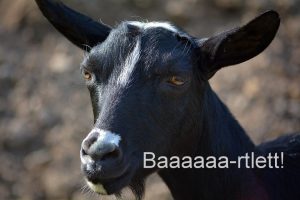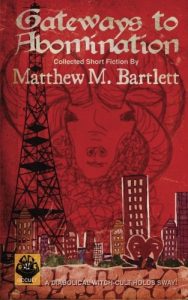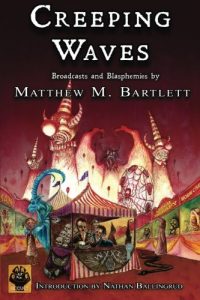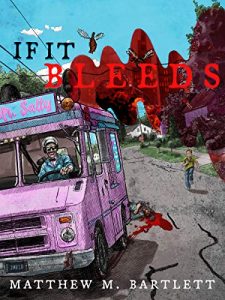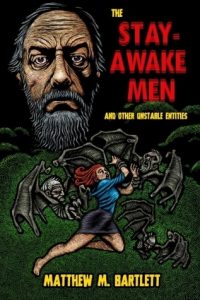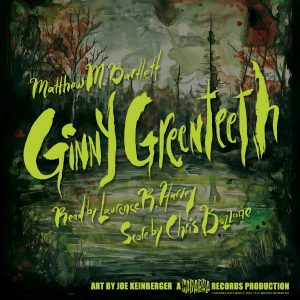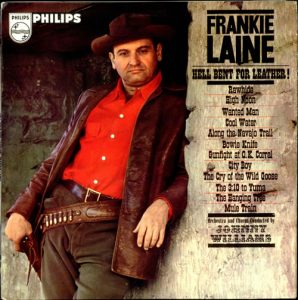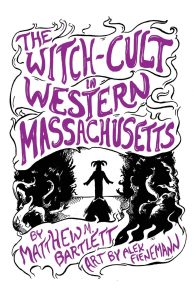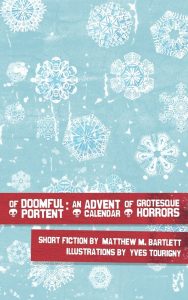Our big, in-depth writer interview of the month, and it’s a darned good one. As you should know, I, greydog, am an unashamed enthusiast of the work of American weird fiction writer Matthew M Bartlett, and it came to me the other day, lying back on my bed of bracken and stolen chicken bones, that it was time we interviewed him properly.
So we sent a number of photographs and only slightly redacted documents to him in the States, and suddenly he was very keen to go ahead. It was all jolly enjoyable, so do read on…
Matthew M Bartlett in the Wild

Interviews are curious animals. Often respectful, sometimes a touch fawning, and occasionally much like a series of press releases. Promotion-o-rama. But what prompted this one, as mentioned above, was a simple fascination with Matthew’s work – and yes, there’s a degree of envy in such thoughts. Envy is one of the five staple food groups for a writer, after all, along with economy own-brand noodles. Decent folk smile and say: “Well done you!” Avaricious jobbing writers like me hiss: “That bastard – he did it first. Back to the bloody ideas bin again.”
However, I remain absorbed by his work; a single paragraph of his, which I think I read in early 2016, told me that we would probably click:
I find Dither weeping disconsolately at the microphone. Ronstadt’s limp body hangs by the neck from a thick branch that has plunged through our modest roof, his neck impossibly folded, his tongue a black bug peeking from a pink letter slot, a coffee mug that says “I Don’t Like Mondays” gripped in his curved rigor mortis finger.
Creeping Waves
What’s not to like about that lovely little scene? Basically, Matthew M Bartlett has a unique, skewed talent which makes him stand out even amongst the many talented writers of new weird fiction today. So now I paint a smile on palsied lips, and try to play nice…
greydog: OK, Matthew – I think it was that talented young colonial Brian O’Connell who first really alerted me to your work, four or five years ago. The key, of course, was mention of Leeds – because I’ve lived in or near there, in the UK, since the mid-seventies, and had no idea until I read your work that there was another one in the States. I even assumed it was yet another Innsmouth or Castle Rock at first. But Leeds, Massachusetts, is a real place. Were you aware that there was an urban Mothership in Yorkshire when you started?
matthew: I was aware of the Leeds in Yorkshire largely because a band I like called The Mekons started there. The Leeds in Massachusetts is actually named after your Leeds. Ours is a small, sleepy village in the city of Northampton, a village that used to be a hub for textile manufacturing, making farm implements, things like that. There’s a pretty little river spanned by quaint old bridges, a short tunnel on a winding road, an old mill building converted into apartments, a bucolic country club, a couple convenience stores, quiet neighborhoods, and a lot of wooded areas.
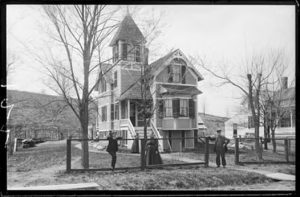
Photographed by The Howes Brothers
The Leeds in my fiction, on the other hand, is a twisted version of the whole of Northampton—a city settled in the 1600s and established as a city in the 1800s, a cultural hub and a college town, the home of some factions of early Spiritualist movements. In my stuff, it’s a place propitious for occult practices and various kinds of devilish deviance. So it is basically a Castle Rock or an Innsmouth, in that it’s a fictional city loosely based on a real city. When I say loosely, I mean that I throw in geographical features and places from all over New England, or anyplace I’ve been, really, if they seem to work for a given story. I’d love to make a map one day.
greydog: It seems more than coincidence that you should mention The Mekons, as it happens that in the same recent issue of Occult Detective Magazine where we publish an excellent story by you and Jonathan Raab, we also publish a parody by David Langford, an old friend who is also… the brother of one of The Mekons. That your own brother, I understand, interviewed Jon Langford at a Boston concert, makes this a conspiracy of massive proportions. Unfortunately, I don’t believe in conspiracy theories, so I can take that thought no further.
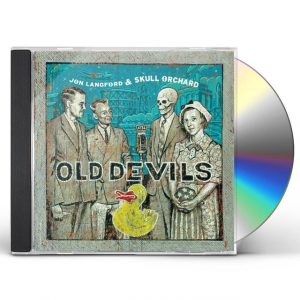
Anyway, thinking about the aforementioned Castle Rock from Stephen King, your own Leeds, Lovecraft’s Arkham, S P Miskowski’s Skillute and others, what is the attraction of fictional locations like these? Do you feel that such discrete, frequently revisited psychogeographies are basically comfort zones for the writer? Or do they represent something else, such as authors’ own experiences of, and issues with, small town life?
matthew: Leeds grounds me in a locale with established geographical features and institutions. In that sense it can be a comfort zone, I guess, although the term “comfort zone” seems to suggest that there’s no room for growth and experimentation there, and I don’t believe that—the borders both physical and metaphysical are not exactly constricting. They’re very malleable. For some authors, these fictional locales definitely serve as commentaries on small towns; for me, if there’s any of that, it’s not deliberate, or at least not overtly so. Northampton/Leeds works for me because it’s so old, the new is just a very thin skin placed over the ancient. Also, a relative recently traced my family to the area, in Colonial times, which I didn’t know when I moved here.
greydog: Cool. Now, the substantial block of Gateways to Abomination, Creeping Waves and If It Bleeds (or Iib Leeds as I prefer to call it) is augmented by both subtle and direct references in a number of other stories, as in the collections Of Doomful Portent and The Stay-Awake Men. Is there a whole garment there in the making, a final hideous pullover being knitted to a pre-existing pattern? Or do you add to it on fairly random, when-the-mood-takes-me sort of way?
matthew: The latter. Or both. I don’t know. Which probably means the latter. I do know I have a basic idea of an overarching plot like a giant jigsaw puzzle, and each story is a patch of pieces, and it’s so big that there are more than enough places to fill in more.
greydog: You rarely tell a ‘straight’ story. Characters, events and symbols intertwine, disappear and then are back – the Government Man in If It Bleeds, for example – sometimes as focal points, sometimes as throwaway references. Or maybe they don’t come back at all, and we’re left to wonder where they went. It’s a striking – and very effective – approach which raises the content of your stories to almost psychopathic dreams. Deliberate stylistic choice, or something which flows from how you think about the world?
matthew: I’m not particularly good at analysing myself and my fiction. I can say that I like writers and songwriters who revisit locales and characters, and who use call-backs. As a reader I find it thrilling to say, Oh, that’s the person from that other book, as if it’s my own private discovery. It’s fun to write that way, too. I may be working on a current piece and think of something or someone barely referenced in Gateways, and work them into the new story. I gave myself plenty of elliptical stuff in the early work that I can come back to and mine for more material.
In the flickering lights, Greyson had a terrible hallucination: for a moment it seemed as though Spettrini’s head was sending tendrils of flesh back to the chair. Where the tendrils hit the surface, the leather took on the magician’s pallor, splotches of flesh spreading like spilled water, and then hair, white and wild, began sprouting from the flesh of the chair. Spettrini reddened, as did the chair, then, as the spinning tables slowed and the stroboscopic effect faded, so did the hallucination.
‘Spettrini’, The Stay-Awake Men and Other Unstable Entities
greydog: Your world is full of facades. Ice-cream vans burn and break open to reveal warped children; skulls split and twisted horns erupt, bodies burst to release the new and terrible things within. Skin is something which is worn like an old suit, not integral to whatever lives inside it. Camouflage and deception; transformation and the incubation of horrors. Should we distrust what we see?
matthew: Again, I’m bad at analysing myself, but it sounds like you’re onto something there! I’m a fairly naïve person, so I’m surprised again and again when I take something or someone at face value, and then the ice cream truck shrugs off its suit and becomes a mobile slaughterhouse. Say I start a new job, and I gamely think everyone gets along, likes one another, despite small disagreements…then I find out there are massive battles going on, people who loathe one another almost homicidally. This reveals itself only after many months, and I’m left to wonder if it was obvious all along. Maybe I’m dealing with something like that when I write. But I worry that if I can pick out particular metaphors or overarching themes in my stuff, I’ll start overthinking it.
You’re listening to WXXT. You are not sure how long you have been listening. Your stomach drowns out the sounds of your radio. A wind howls. The batteries die. Infants mewl at your feet. Up next, the swinging sounds of Dino Paul Crocetti. You know him as Dean Martin.
Gateways to Abomination
greydog: I’m with you on the overthinking bit, which makes some of these questions a bit ironic, but we must screw our courage to the sticking post, as Lady Macbeth said when her soufflé collapsed yet again. Beyond visual cues, there’s a huge aural component to your fiction, from background static to explicit WXXT broadcasts; Fat Andy and the Peepers, fragments heard in the background, old records and spoken words which make no obvious sense. There’s Music of the Moldering, of course, and you’ve worked with Cadabra Records. All these suggest that aural stimuli play a large part in your own life, yes?
matthew: Yes. I like listening to music, which isn’t exactly unique, but as a teenager the mix of music—mostly what we now call Classic Rock and then punk and new wave and goth stuff—and the hour-long spoken word/comedy shows our local stations played really opened up pathways in my head, and made me think about what we hear vs. what we see. Which brings us back around to the last question.
I remember there was a deejay on WCCC, our local rock station. He had one of those cool-guy rock voices, a little raspy but well-modulated, professional but gritty. I pictured him as a tall, sandy-haired guy with a sharp nose and arched eyebrows and a motorcycle jacket, face like a younger version of the character actor Jere Burns from Breaking Bad and Justified. One night I went to a show where that deejay introduced the band, and he was just a tiny, sort of hunched guy, balding, with a scraggly beard. On the radio he was The Lich; in real life, he was just Hal Lichtenbaum. It may be somewhat significant that I got heavily into music, and at the height of that interest, MTV came out and I began to see the people who made the music. Or it may not. Who knows?
greydog: I always find the problem with music videos is that I can never quite disengage the song from the images (including what the singer looks like) afterwards. And for years I thought that Frankie Laine really looked like his photo on the cover of Hell Bent for Leather, one of my favourite teenage albums. He didn’t.
And still on the aural stuff, you frequently reference a real organisation, the Federal Communications Commission (FCC) – but as I read more of your stories I’m no longer sure of their role. At first I saw them as the Radio Police, maybe even the ‘good’ guys, but now… are they the investigators of deviant transmissions, the instigators of them, or both?
matthew: I use a fictionalized version of the FCC, which I plan to flesh out and use as antagonists in the third ‘canon’ WXXT book. Listen to this: Calvin Coolidge was once the mayor of Northampton. He also signed into law The Radio Act of 1927, which spawned the Federal Radio Commission, which was later replaced by the FCC. The connection to Leeds is irresistible. My FCC will be composed of mystics, former occultists, and religious fanatics and cops who decide to wage war on my little radio concern. They’re technically “good guys,” I guess, but not for me. They’re on the side of law and order; they’re corrupt, twisted Christians who want “decency” on the airwaves—like, nothing but wholesome content, while they themselves roil in the muck of corruption and vice. So they’re the bad guys, and my band of demons oppose them. There are no real “good guys.”
greydog: Leeds, Massachusetts is modern in one sense, the ‘skin’ you mentioned above, but your fiction in general does draw on history, from the witch-elders, New England historical disquiet, through to wireless and number station references which seem to belong more to the post-war era than today. How do you feel about weird fiction which is explicitly set in the deeper past – ‘period’ fiction? Can it achieve the impact of contemporary-set work, or it safer because of its chronological distance?
matthew: I like weird fiction set in the past, though I frequently start to wonder whether this or that is historically accurate. It’s certainly a worry when writing any kind of historical fiction. I do think it can achieve the impact of fiction set in contemporary times, because people as a whole don’t change much, and the past is always bubbling up. Look at the brilliant work of Daniel Mills and Scott Tomas for terrific fiction set in New England’s past.
greydog: I’m getting into Mills’s istorical accuracy research for this sort of thing is a strange fish, because you know that most readers won’t care, yet there will always be someone who knows when the left-handed sprocket wrench was really invented – and call you out on it. I live in fear of those people.
Staying historical, as a Britlander I often say that my own nonsense draws more on writers such as Saki, William Hope Hodgson, Blackwood and Dunsany than it does on the 1920s to 1940s ‘Weird Tales’ tradition. And I love subverting classic British approaches. But when I started writing weird fiction, there was always an elephant from Providence in the room – and sometimes the beast annoys me. Do you ever get tired of people trying to talk about ‘Lovecraftian’ elements in the contemporary field?
matthew: I don’t think I would have tried writing weird fiction if not for having read Lovecraft, so I do have a bias. However, I’m not overly fond of pastiche, or of explicitly using Lovecraft’s various genius creations, unless I’m working satirically or in parody, which I do from time to time. Eventually I want to self-publish a smallish collection of my Lovecraft parodies, but one of them is in an anthology that hasn’t been published yet, and it’ll be quite some time before I get the rights to it back.
greydog: I look forward to that. So, at the end of it all, when your work is out there – it’s great to get good reviews, which you do (a lot) and yet also fascinating to get bad ones. I’ve had books I was in marked as 5 Star Must-Reads, only to have one Amazon reader say rate it as One Star – ‘Total garbage’. And I rather liked a One Star given to your Gateways (as opposed to the one hundred plus 4 and 5 Star reviews), where the reader missed the entire point, said they could write that sort of thing easily, and then totally proved that they couldn’t, by trying it. Do reviews influence you in general? Do they ever steer what you do next?
matthew: I’m not one of those writers who boasts about never reading reviews; I read every review I can get my hands on. I can’t really say that they influence me. The negative ones rarely have much to teach me; the work either didn’t resonate with them, which is fine, or they just think it was outright bad-which is also fine! It’s certainly not for everyone, not even every horror fiction reader. It’s true that here and there someone misses the point entirely, like one reviewer who complained that I wasn’t honest when I used the phrase “Collected Short Fiction” on the cover of Gateways, not realizing that that was a calculated ruse meant to trick the reader into thinking that he or she wasn’t reading a short novel I have to admit that some bad reviews sting.
Some are hilarious. Maybe I’d find them less funny if I didn’t have so many positive ones to offset them. Sure, occasionally, though, there is insight. One reader said something like “too many worms devalue the currency” – and I get that. Gateways was what I called “distilled” horror. There aren’t sympathetic characters (there are hardly any “characters” at all), and there’s precious little in the way of normalcy to offset the weirdness. It’s a barrage. That wasn’t necessarily calculated. Some people loved it, and others who had different expectations were disappointed.
greydog: I absolutely loved it. And finally, a brutal, incisive question. Why goats?
matthew: They’re very cute, but they have horns and weird eyes and creepy teeth, and when they bleat it sounds eerily like a human yelling. They’re wonderfully devilish. I’m just annoyed I didn’t invent Black Philip before Eggers got there.
greydog: Thank you so much, Matthew for joining us. We imagine we were a pleasure; you certainly were.
IMPORTANT INTERVIEW NOTE
We failed to ask Matthew about which up and coming authors he likes, who stands out in weird fiction at the moment, and who were the great classic writers. This was because we thought it was a bit boring, and we were more interested in him. But he probably has a favourite colour, or something. We don’t know. Oh, and he loves cats.
Have a look at Matthew M Bartlett’s Author Page on Amazon UK or US… and buy a book!
https://www.amazon.co.uk/Matthew-M.-Bartlett/e/B00M5HEX5Y
https://www.amazon.com/Matthew-M.-Bartlett/e/B00M5HEX5Y%3Fref=dbs_a_mng_rwt_scns_share
